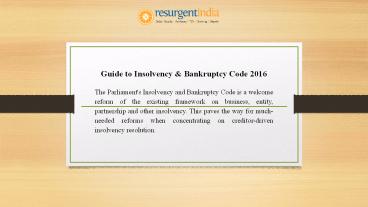Guide for preparation of resolution plan under IBC - PowerPoint PPT Presentation
Title:
Guide for preparation of resolution plan under IBC
Description:
The Insolvency and Bankruptcy Code, 2016 was sanctioned with the resolution to combine and alter the laws identifying with reorganization and insolvency resolutions of corporate people, firms under a partnership and individuals in a time bound manner. The principle expectation behind the code was to amplify the value of the assets of such people, promote the idea of entrepreneurship, guarantee the accessibility of credit and make sure to balance the interest of all stakeholders in such a way that the payment of government dues come up in the order of priority. – PowerPoint PPT presentation
Number of Views:83
Title: Guide for preparation of resolution plan under IBC
1
Guide to Insolvency Bankruptcy Code 2016
The Parliament's Insolvency and Bankruptcy Code
is a welcome reform of the existing framework on
business, entity, partnership and other
insolvency. This paves the way for much-needed
reforms when concentrating on creditor-driven
insolvency resolution.
2
(No Transcript)
3
Insolvency and Bankruptcy Code 2016 was passed in
May by both the Parliament houses after making
modifications based on the recommendations and
suggestions made to the Joint Committee to the
Insolvency and Bankruptcy Code 2015, which was
passed in Lok Sabha on December 21, 2015.
4
The Insolvency and Bankruptcy Code 2016 in India
is an advanced step in the resolution of the
legal position on financial failures and
insolvencies. The Code has significant value for
all the stakeholders including various Government
Regulators to provide easy exit through a
painless mechanism in the event of insolvency of
both individuals and the company. This code is
introduced and overlaps provisions in various
laws have been eliminated
5
- Sick Industrial Companies (Special Provisions)
Act, 1985 - The Recovery of Debts Due to Banks and Financial
Institutions Act, 1993 - The Securitization and Reconstruction of
Financial Assets and Enforcement of Security
Interest Act, 2002 - The Companies Act, 2013
6
- Applicability of the Code
- Insolvency, liquidation, voluntary liquidation or
loss of existing companies shall be subject to
the provisions of the Code - Every company established under or under any
previous law under the Companies Act of 2013. - Any company other than the provisions of such
special act, governed by any special act
currently in force, is not in conformity with
those provisions.
7
- Limited liability partnership in accordance with
the LLP Act 2008. - Any other body currently in force in accordance
with any other law, as specified by the Central
Government in this respect - Partnership companies and persons
8
The Code's smooth functioning relies on the
working of new entities such as insolvency
specialists, professional insolvency companies
and information services. The proper functioning
of the system would allow certain institutions to
evolve over time. However, the National Companies
Law Tribunal (NCLT), which adjudicates corporate
insolvency, has not yet been created, and the
Debt Recovery Tribunal (DRTs) are flooded with
pending cases. Visit Here https//bit.ly/2TM7mum

